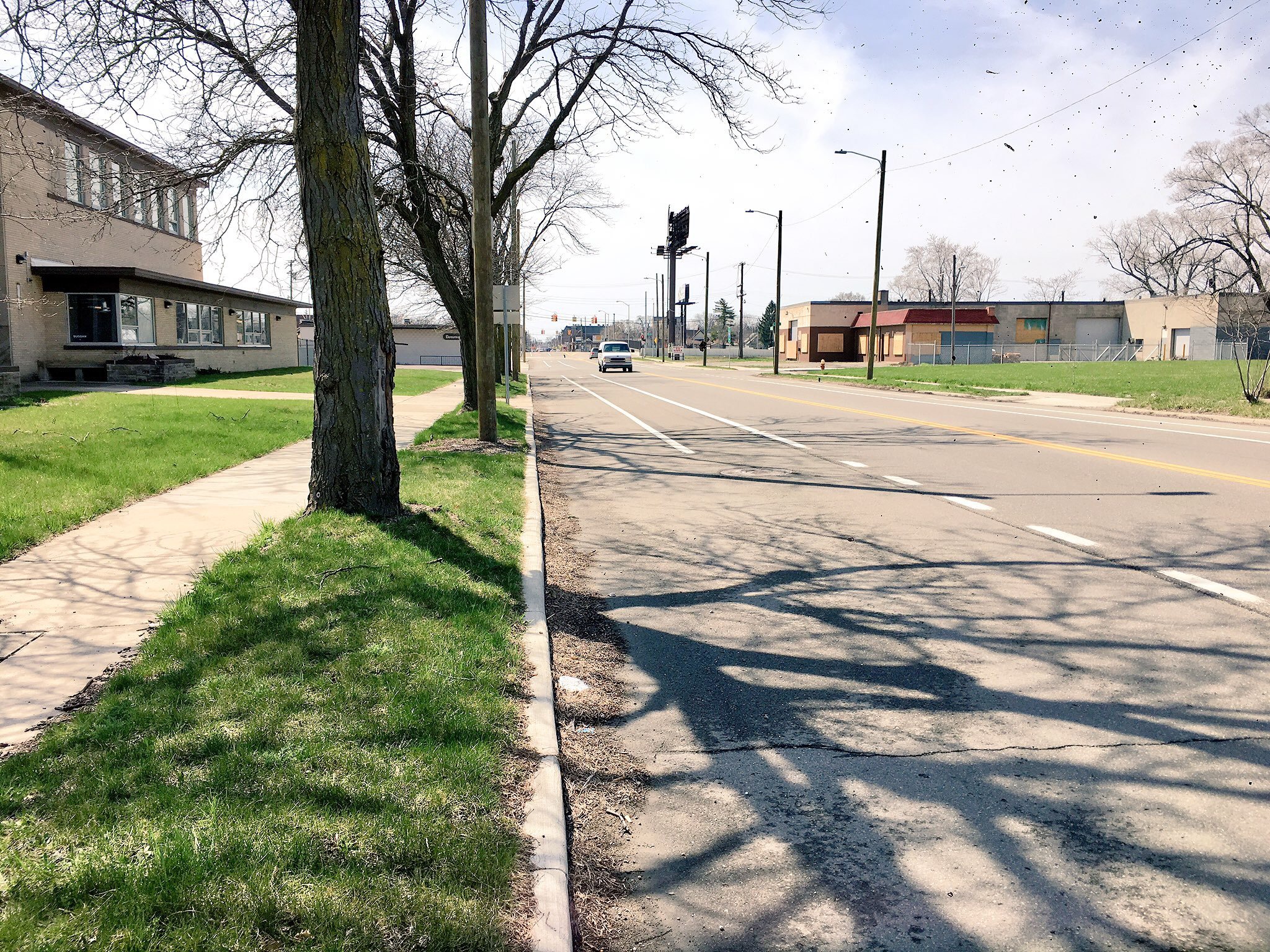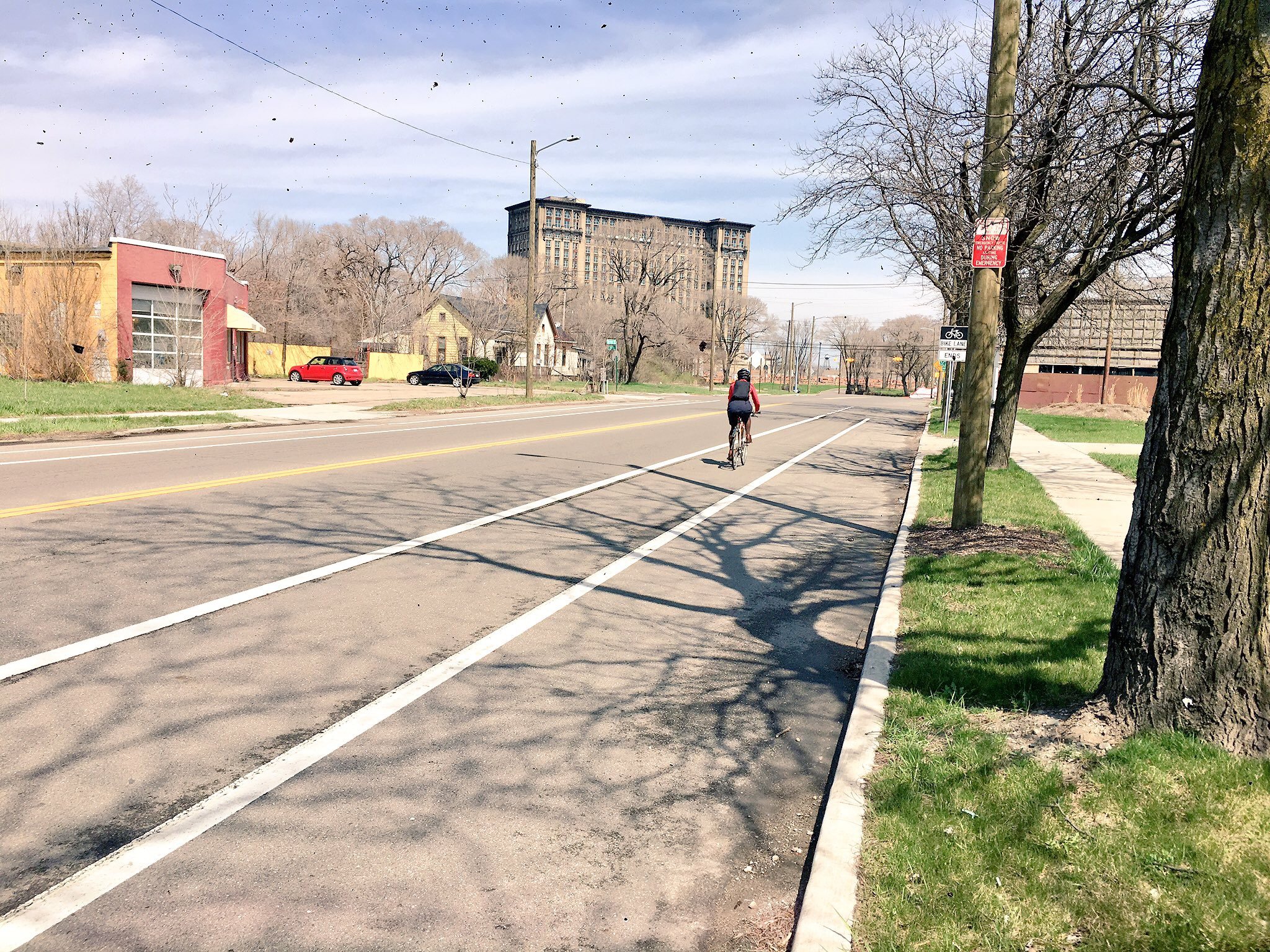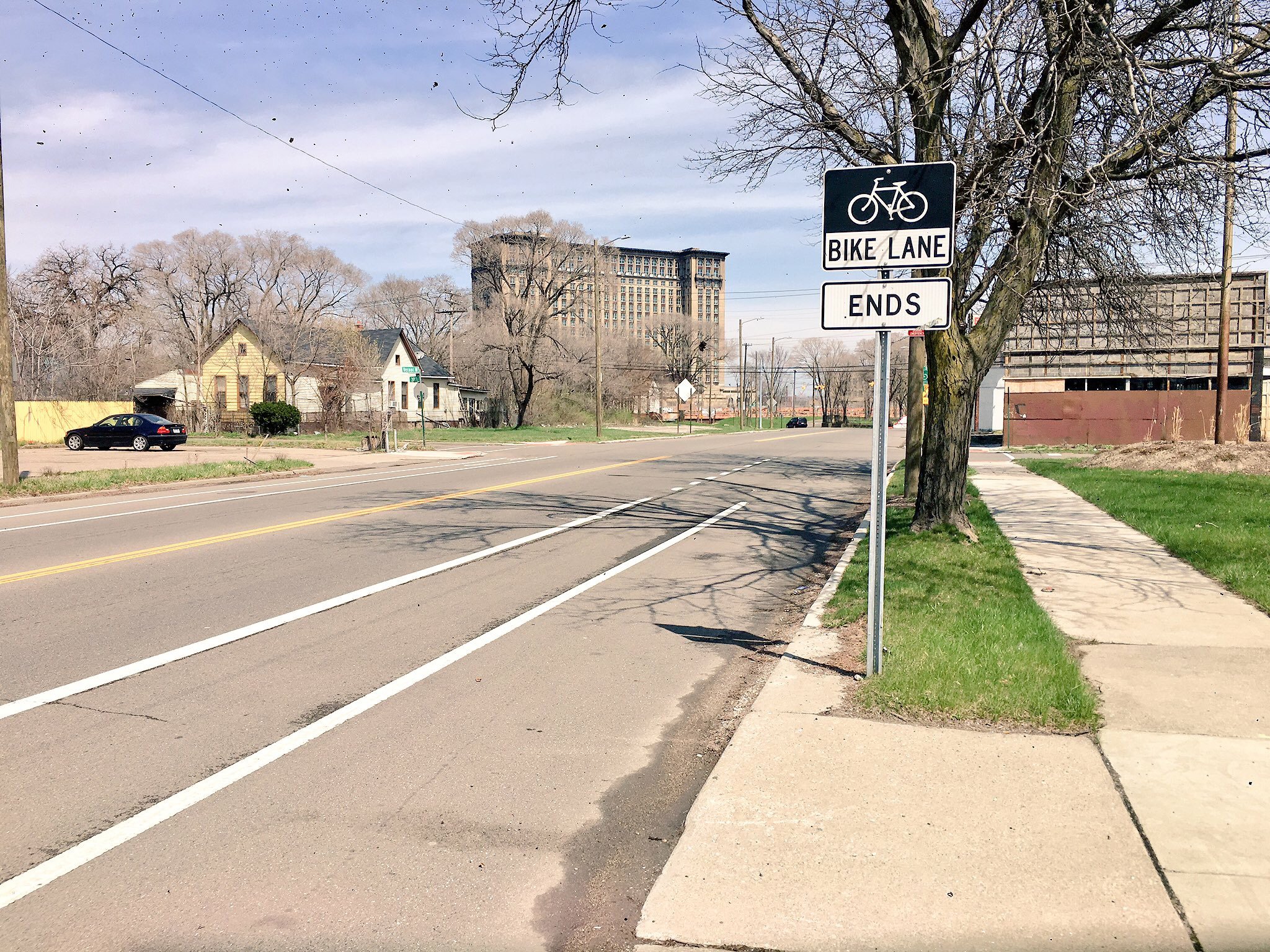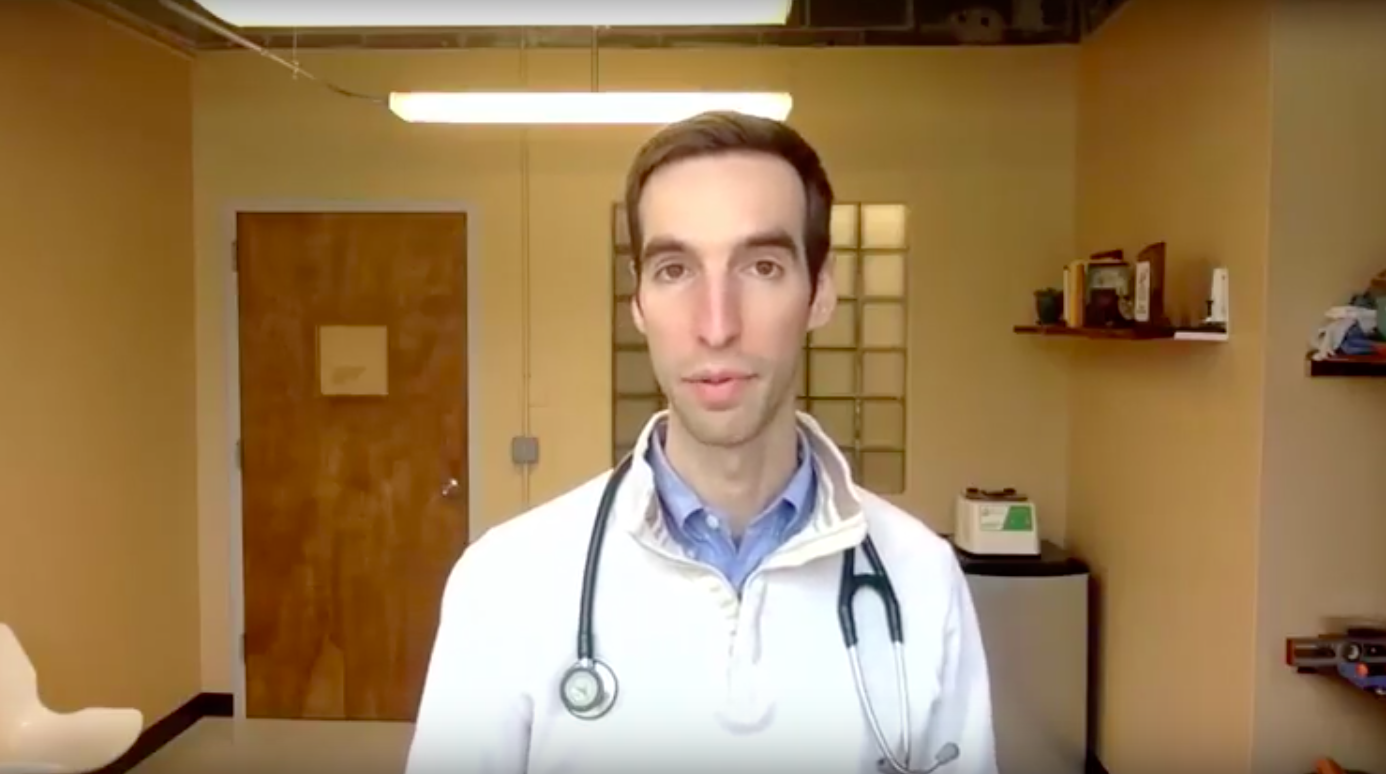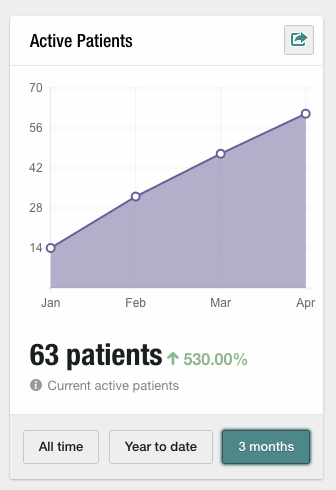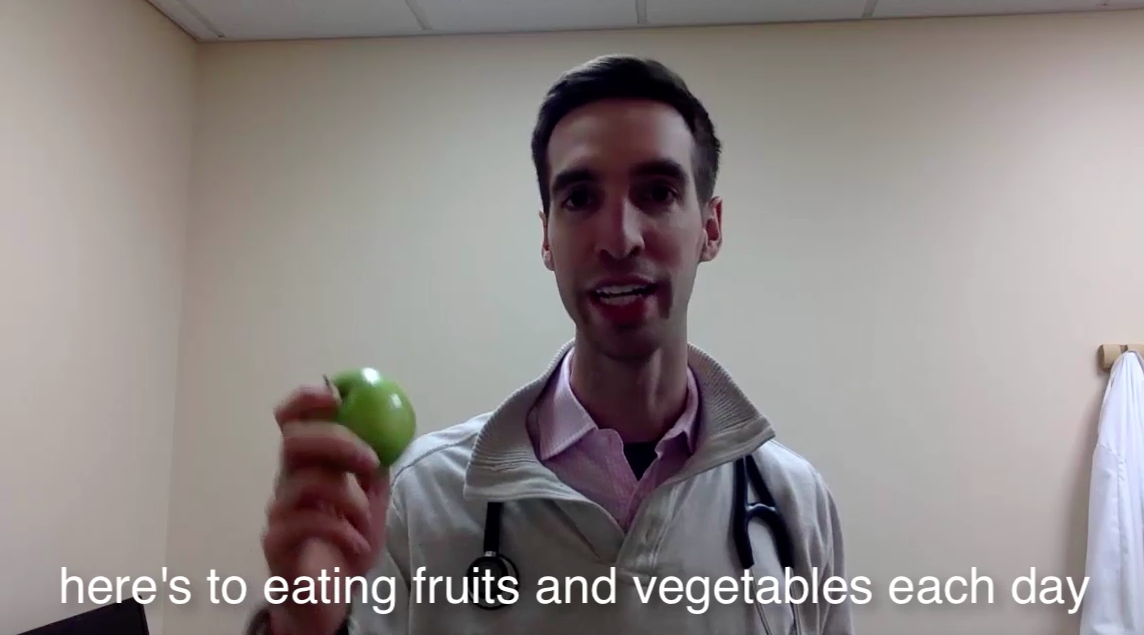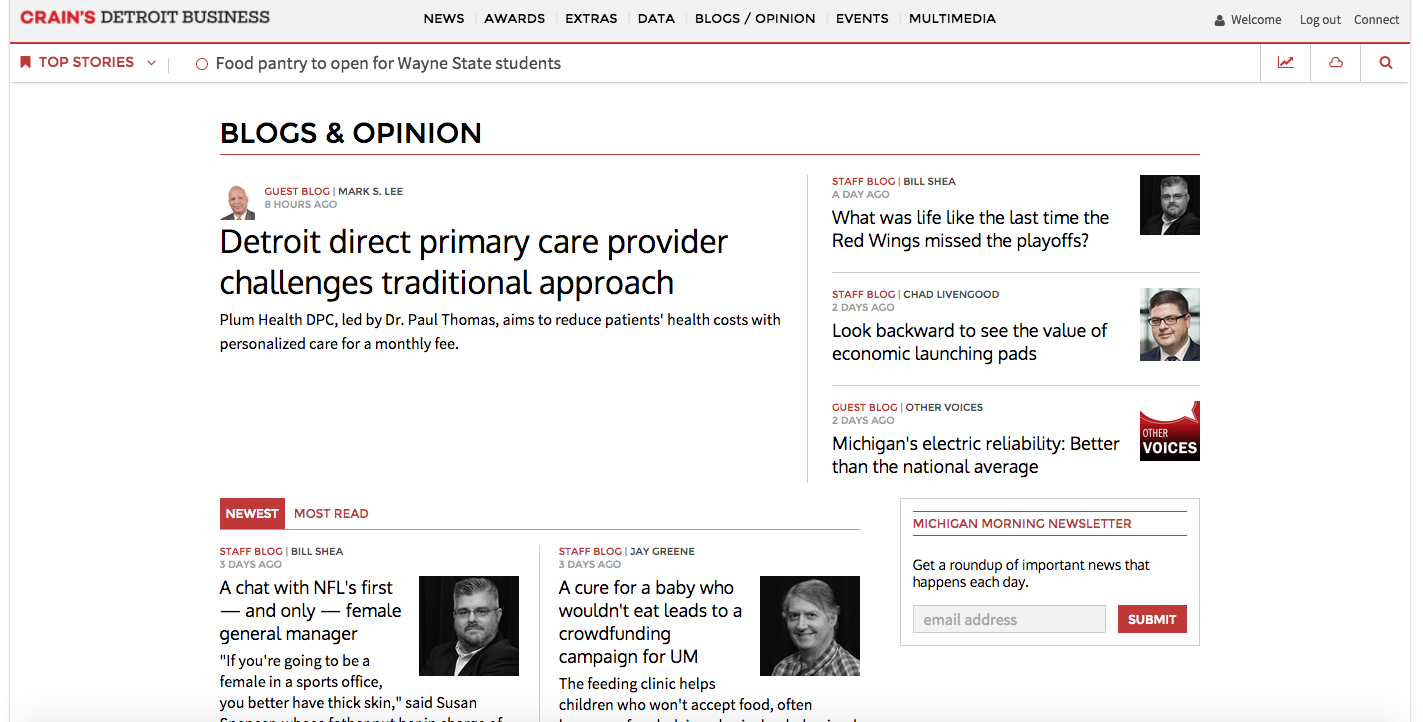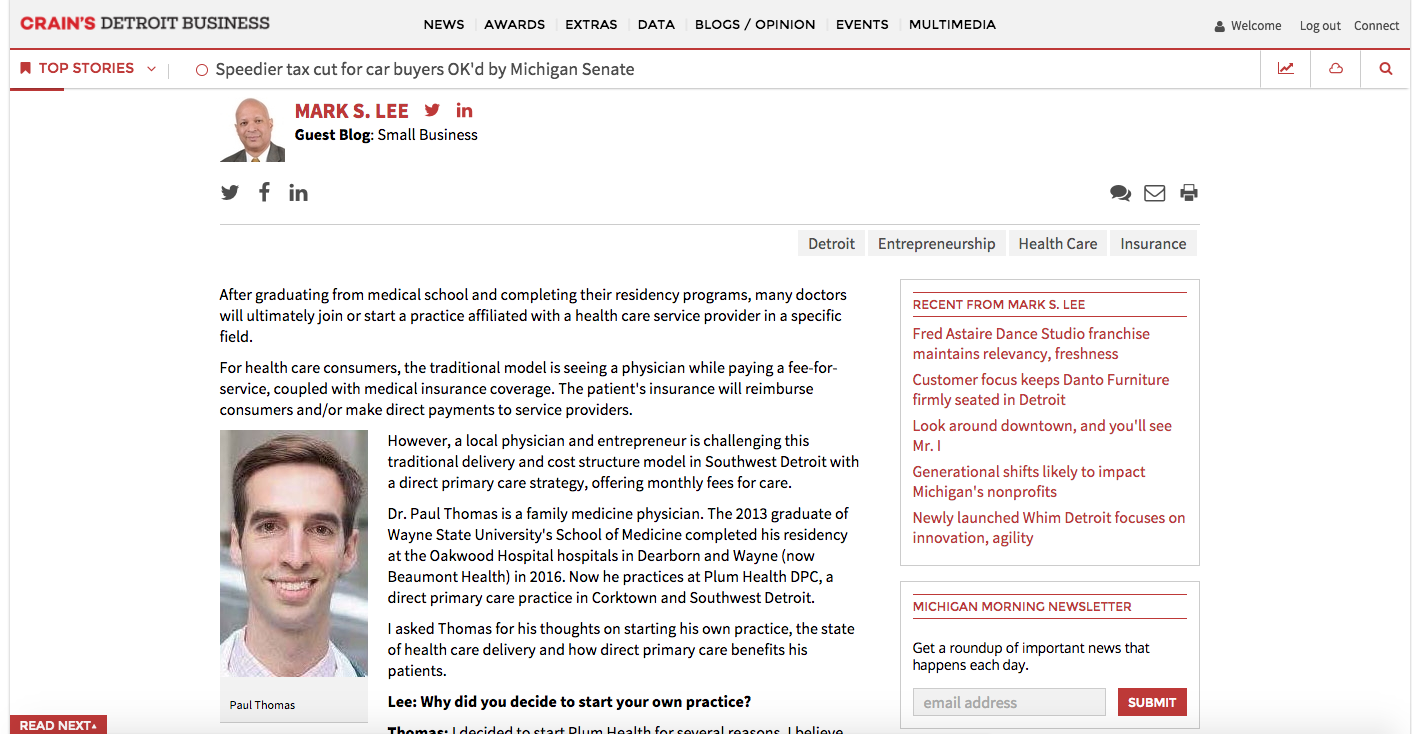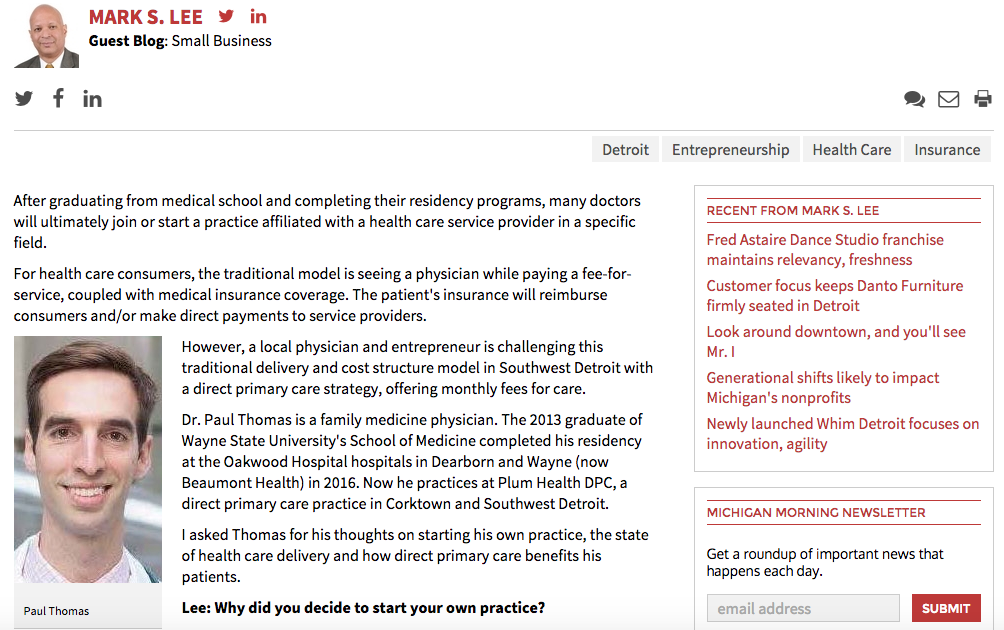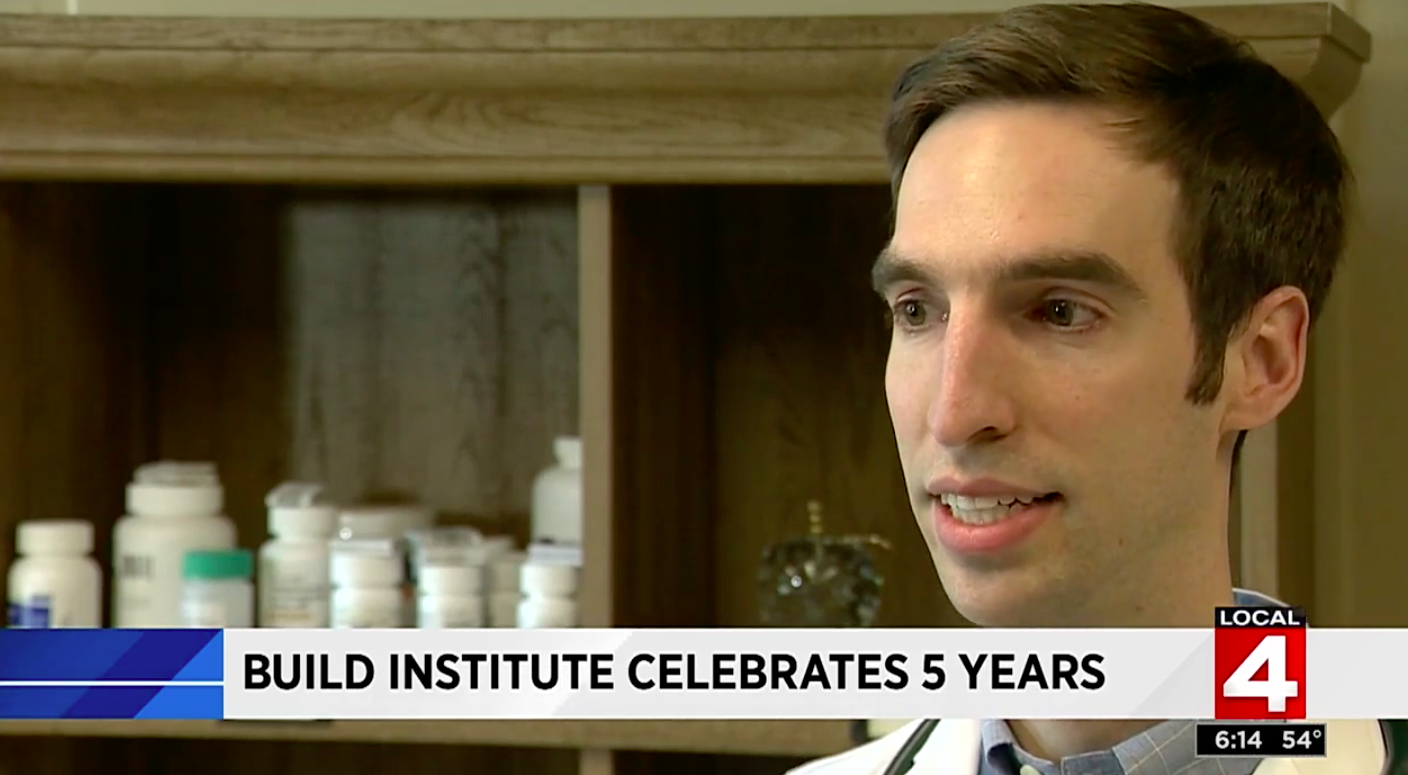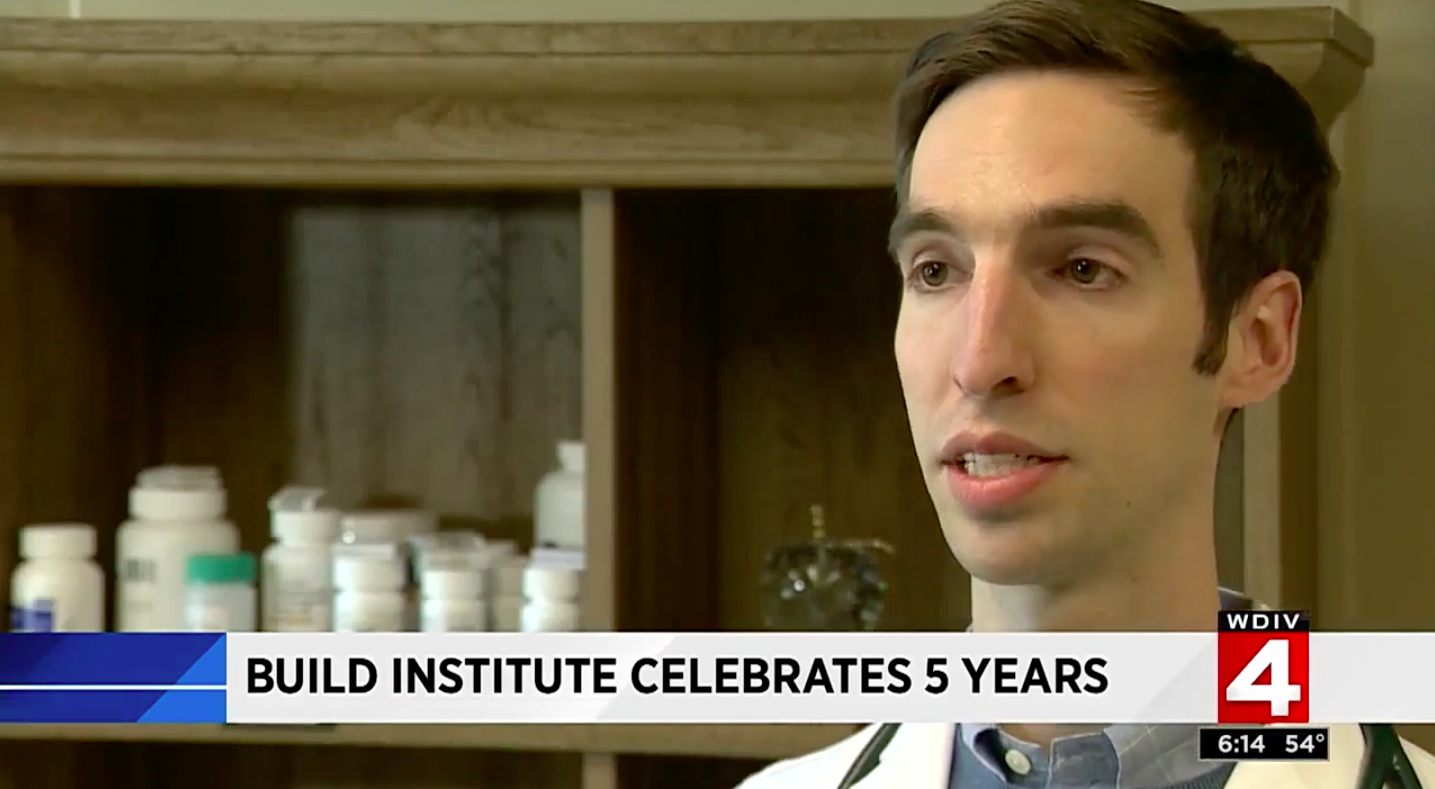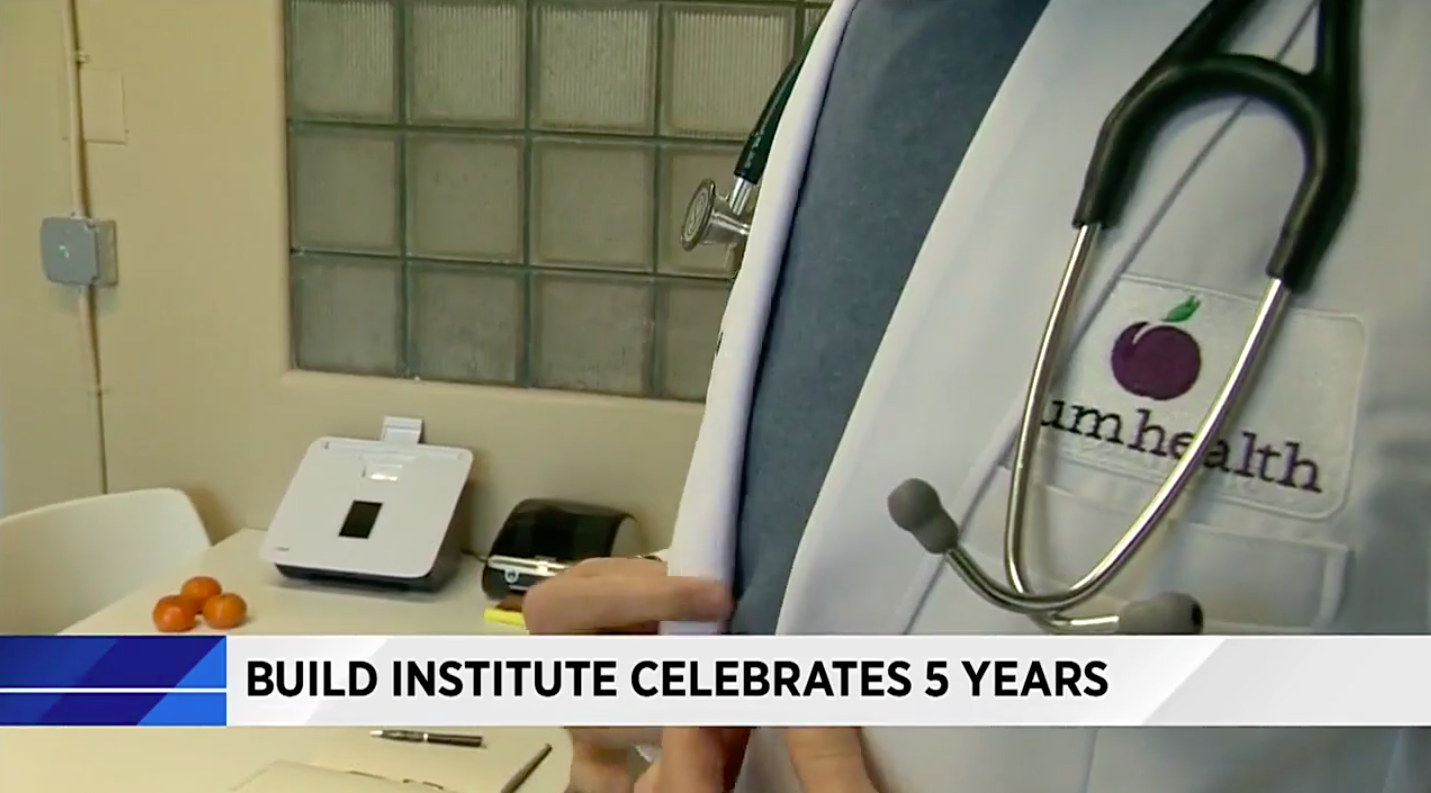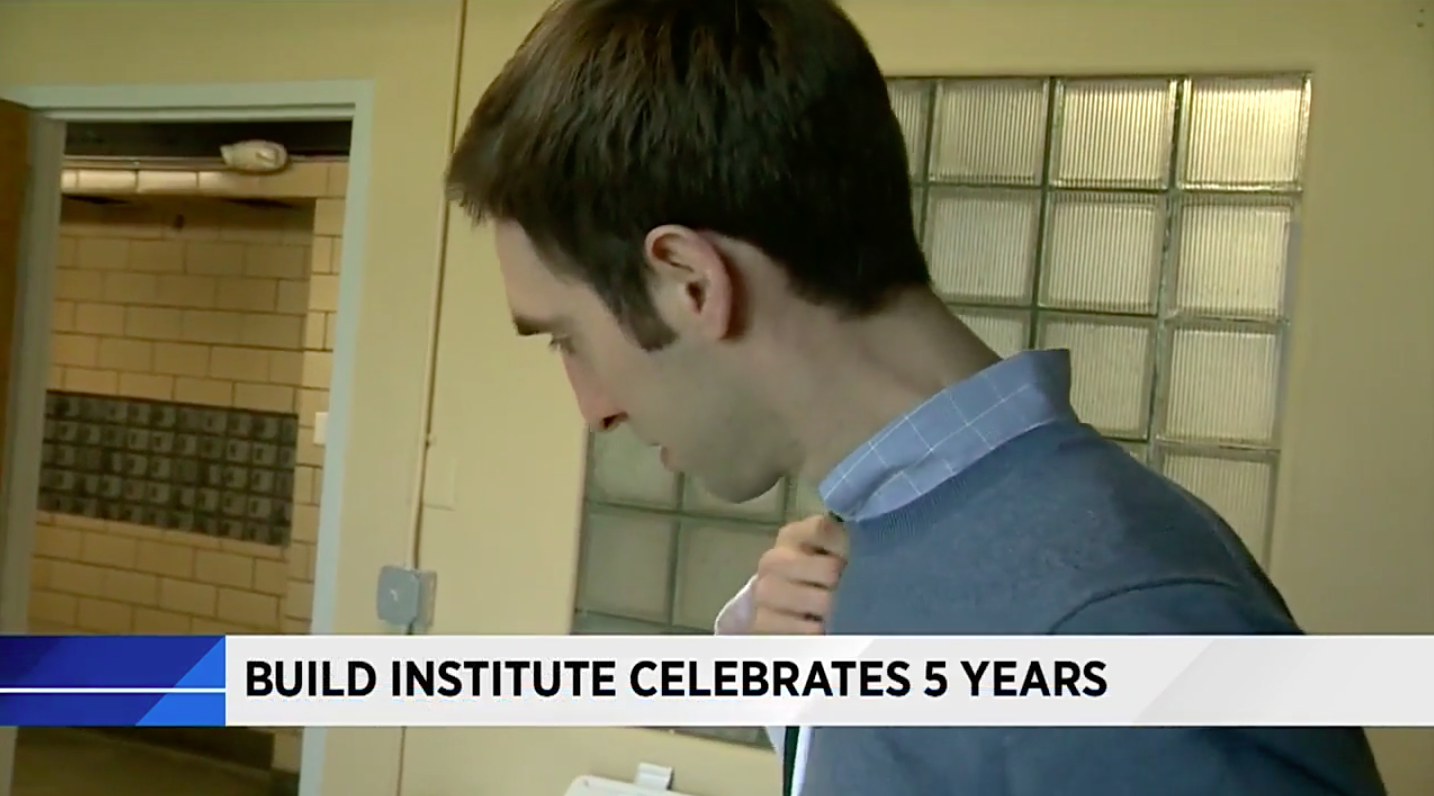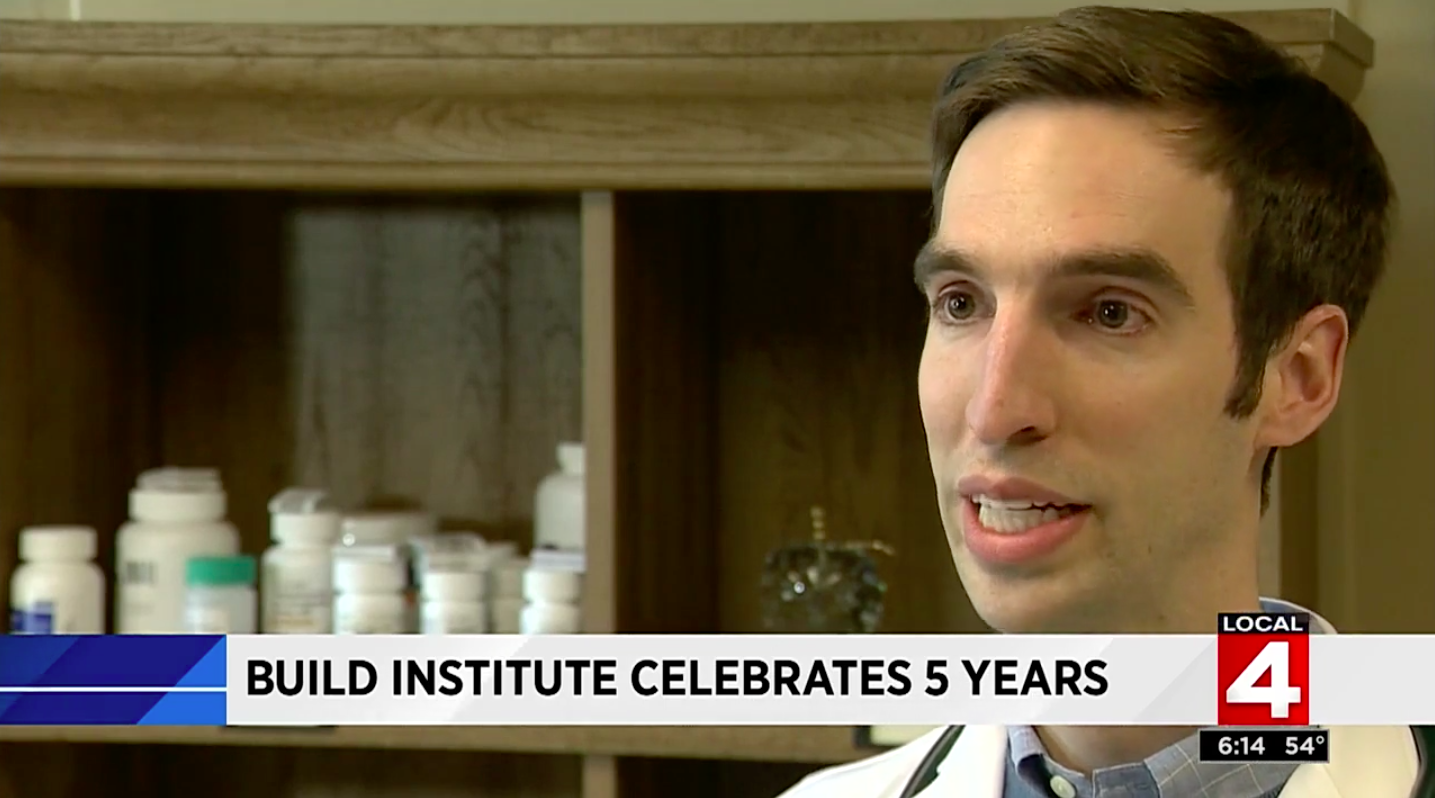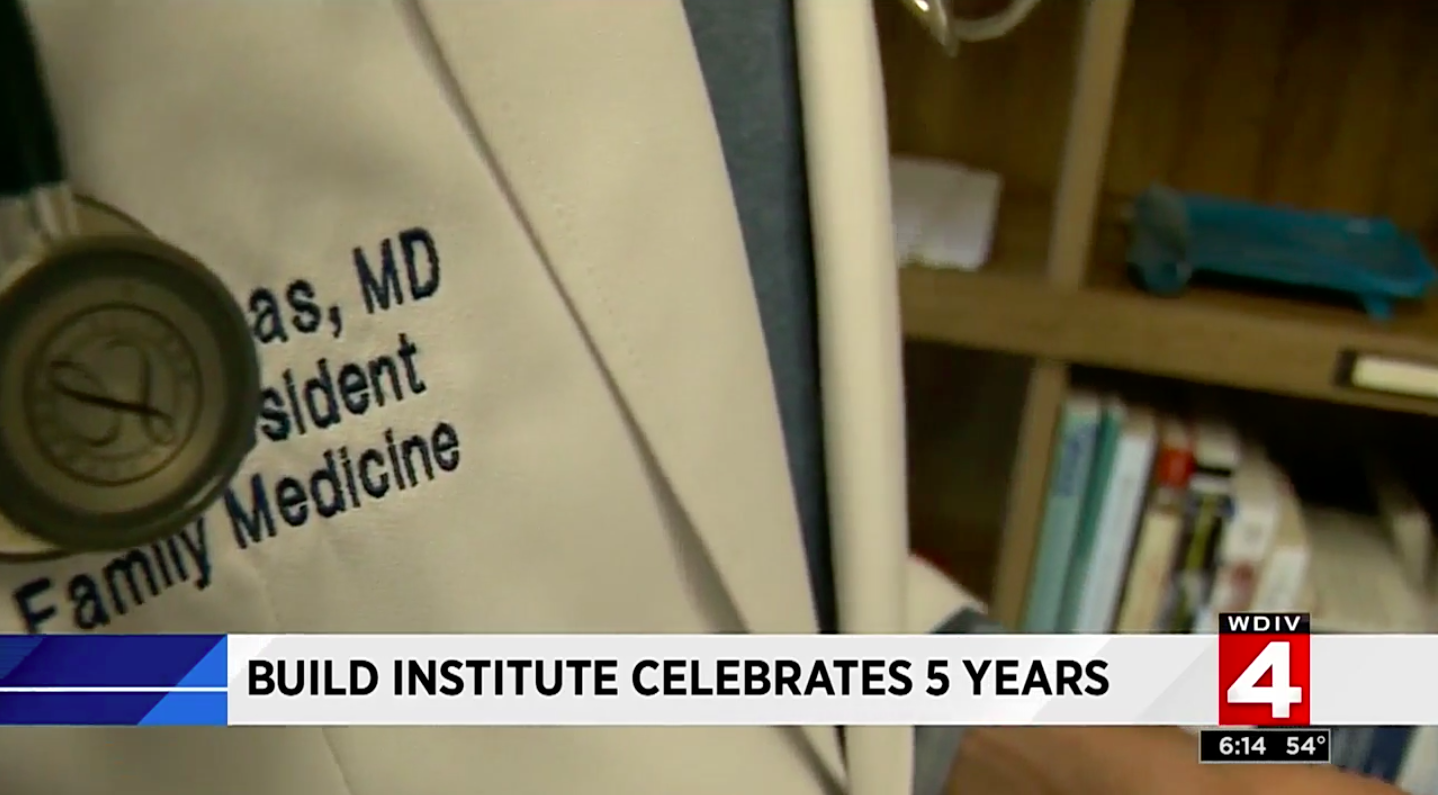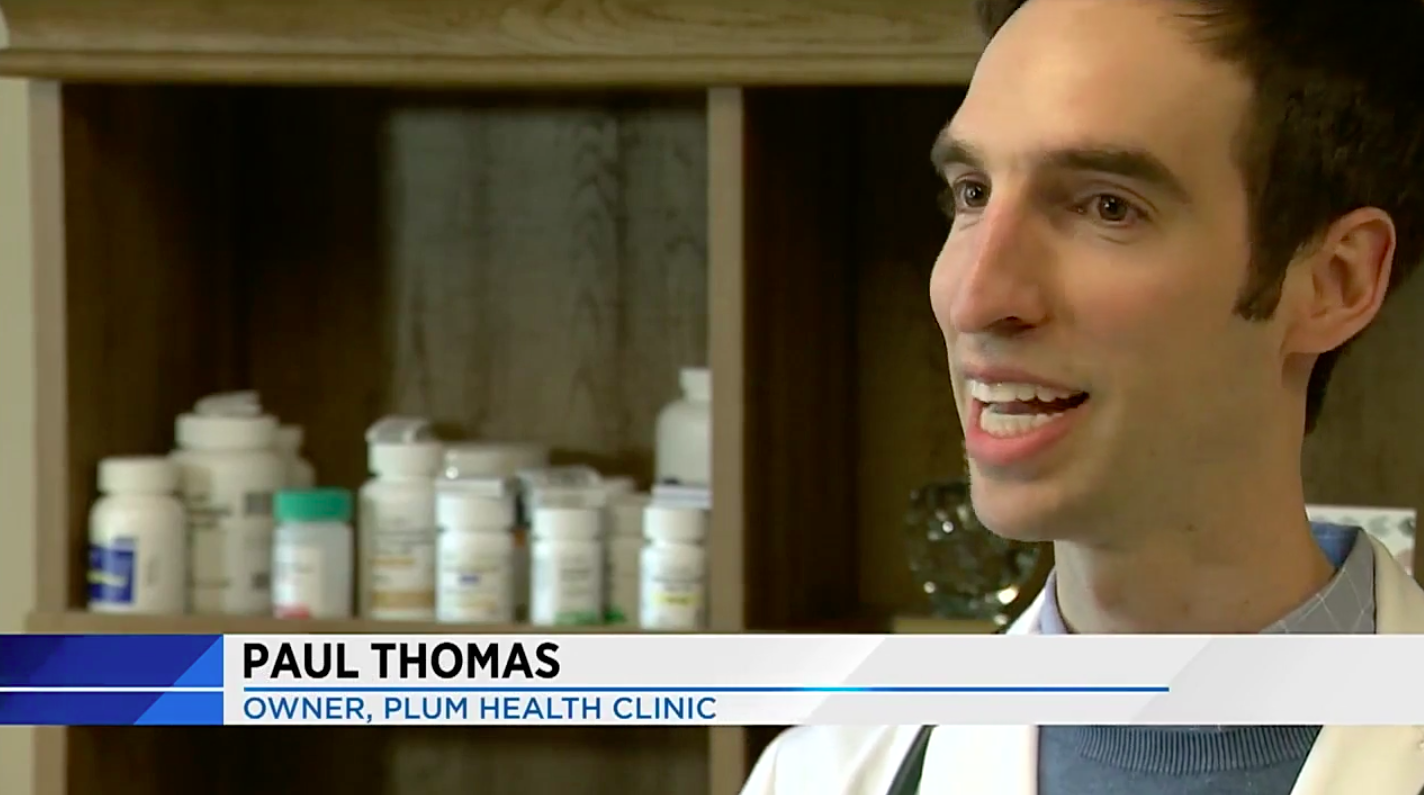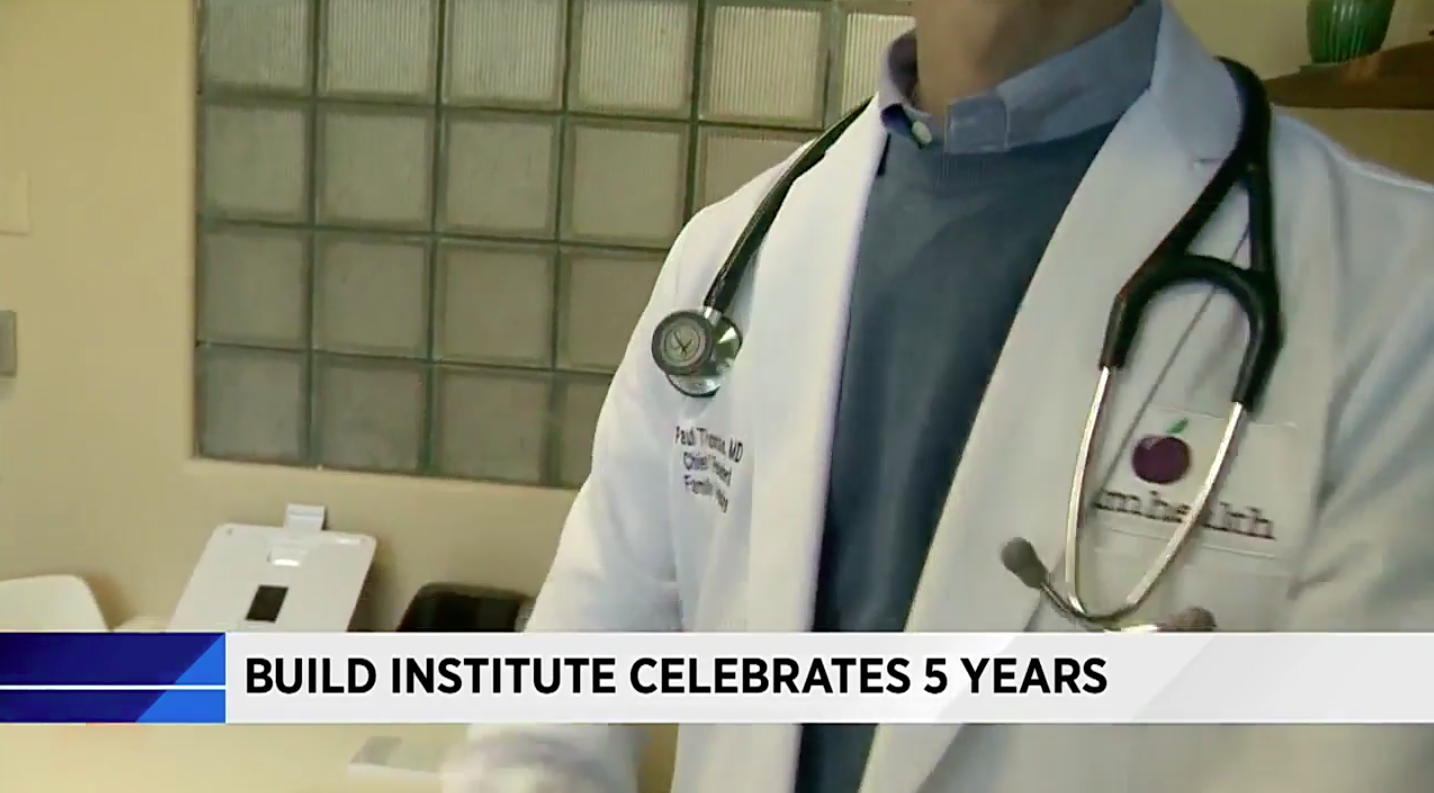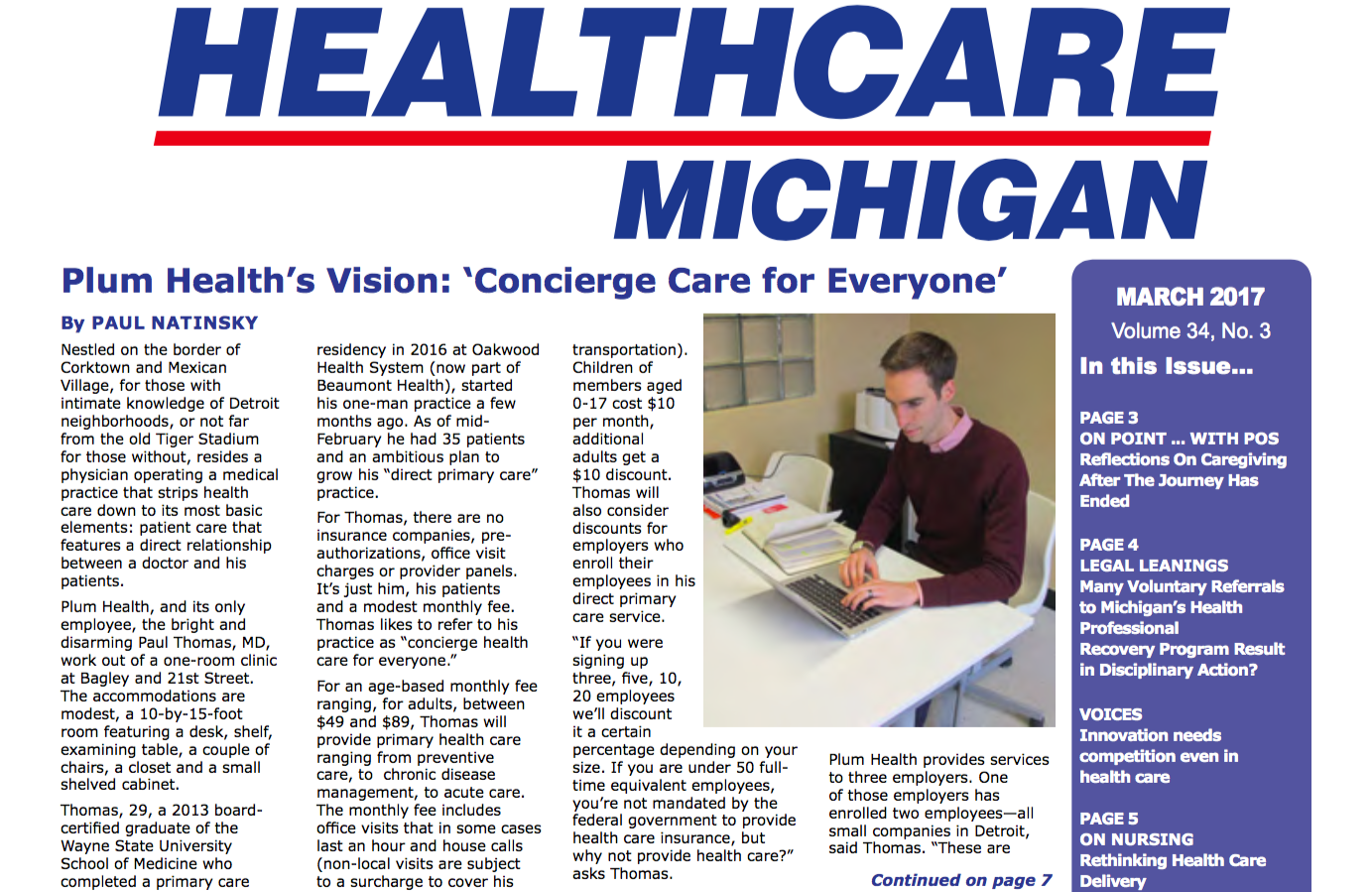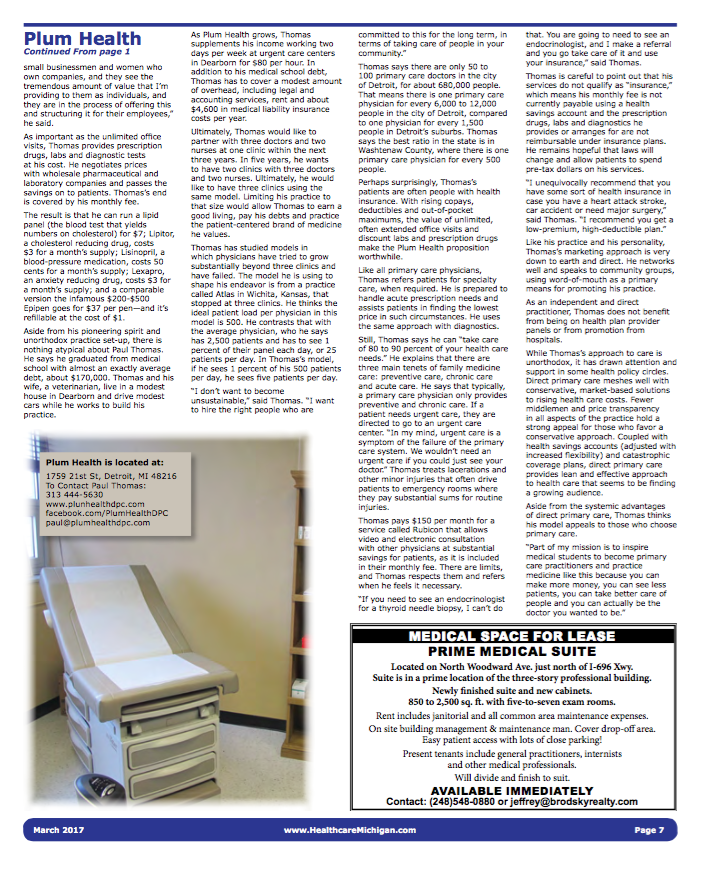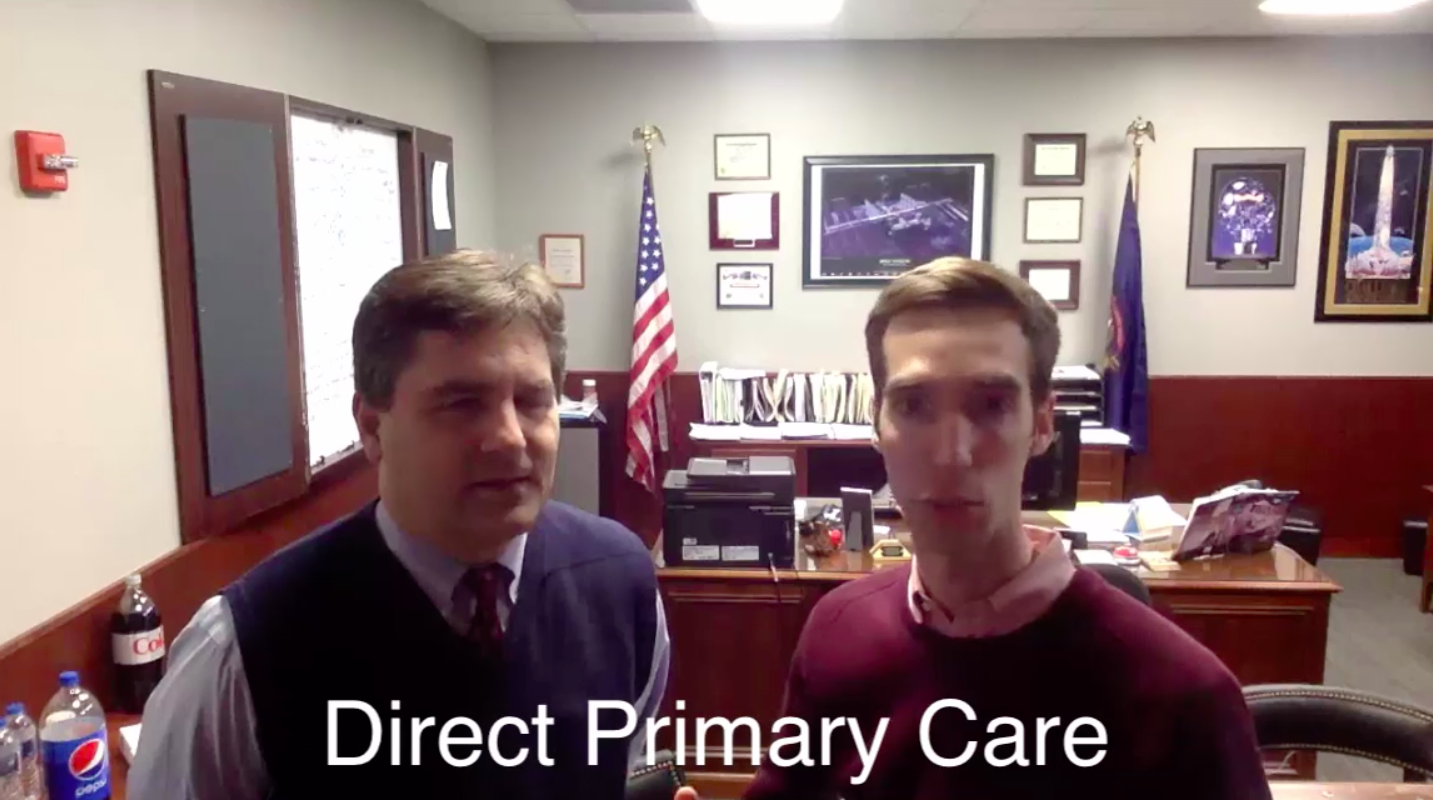Plum Health Blog
Where the Bike Lane Ends
When I think about creating an affordable, accessible healthcare service in Detroit, there are many factors that I consider. One of them is physical accessibility by foot, by bike and by car. How can I help to ensure that all patients and community members have access to the resources that I provide in my Family Medicine practice? Am I able to serve the spectrum of people with varying incomes and abilities in my office? What barriers do people face when trying to get to my clinic?
Our Plum Health office is situated about 1 block from I-96/I-75 near the Vernor Highway exit. That's right, my office sits at the intersection of 2 "highways". Vernor Highway is not much more than one lane of each traffic in each direction, but the sentiment remains. We have a parking lot, there is sidewalk leading to our entrance, we are on a bus line, and we have parking spaces for persons with disabilities.
However, there is one area where we can improve! There is a Bike Lane on Vernor Highway in both directions that extends from SW Detroit and ends in front of my office in between 20th and 21st Streets. This is unfortunate, because there are Bike Lanes going in both directions on Michigan Avenue, less than 0.5 miles away.
All I'm saying is that there's a real opportunity here to connect SW Detroit, Mexicantown and the historic West Vernor Business District with Michigan Avenue, Corktown, and the Corktown Business District.
So for anyone in the City of Detroit, if you're reading/watching/listening, here's my prescription for a healthier road, healthier neighborhood, and healthier community:
- Clean up the garbage that has accumulated underneath the Michigan Central Station Rail Lines and along West Vernor highway. I'd be happy to help with this myself or by organizing a group of people in the community to assist or get this done. However, we would likely need support with some bulk collection if we went this route!
- Extend the Bike Lane on Vernor Highway between SW Detroit at 20th Street and Michigan Avenue. This would be relatively easy and would make for a safer crossing in the greater Roosevelt Park area.
- Cross walk markings in the Roosevelt Park area. There are several intersections in the Roosevelt Park area that are not demarcated by cross walks. This makes for dangerous crossings for pedestrians and bicyclists and ultimately less connected neighborhoods.
- Install lighting underneath the Michigan Central Station's viaduct.
Ultimately, citizens in Detroit face challenges with regular activity, obesity, and access to healthy food and parks. Creating an inviting environment for healthy activities by investing in Complete Streets at key intersections will be beneficial and will make an impact on the lives of residents in Detroit.
Sincerely,
- Dr. Paul with Plum Health DPC
Direct Primary Care versus Concierge Medicine
The phrases Direct Primary Care and Concierge Medicine are sometimes used interchangeably, but they are distinct entities.
The Concierge Medicine movement began around the year 2000 with doctors charging an access fee for their services while still billing insurance companies. The average membership cost for Concierge Medicine is roughly $2,000/year and up to $15,000/year.
Contrast that with Direct Primary Care or DPC. The DPC movement began around 2010 with doctors like Garrison Bliss in Seattle and Josh Umbehr in Wichita among others. Memberships cost roughly $10 - $100/month. There is an emphasis in DPC on a monthly membership structure - members are not locked in for a 1 year commitment.
In Concierge Medicine, the membership costs allows for access. Because the membership cost is relatively high, these types of practices attract the top 1% - 5% income earners. These high income earners are relatively price insensitive, so they are not as concerned about saving money on medications, labs or imaging. These patients are willing to pay for these ancillary services via their insurance even though the price may be inflated.
In Direct Primary Care, the membership includes more services. DPC doctors typically don't charge per visit fees and they try to move away from fee-for-service type transactions. Many ancillary services are included in DPC memberships, like EKGs, Spirometry, Wart Removal, etc... In addition, DPC docs get their patients wholesale medications, at-cost labs, and at-cost imaging services.
Concierge Medicine clinics attract members via programs like "Executive Physicals" or "Executive Health". These are tailored to high-income earners like people in the "C-Suite", aka CEOs, COOs, an CFOs.
Direct Primary Care doctors focus on health maintenance, wellness, and the bread and butter primary care services like preventive health, screening tests, chronic disease management, and acute care needs.
Concierge Medicine practices often mandate that you carry a high-end insurance policy - these practices often bill their patients' insurance companies for routine visits or services.
Direct Primary Care doctors do not bill insurance companies for the services they provide. That means that DPC doctors can take care of patients across a wide spectrum of coverage. For example, if you are uninsured, underinsured, or fully insured, you can be seen at Plum Health DPC. This is true for most DPC clinics.
I put together a short video to emphasize some of these differences. The audio got a little out of sync near the end, so I'm sorry about that! I'll try to re-shoot it later this week!
- Dr. Paul with Plum Health
One last thing, if you’re a Primary Care Doctor or Allied Health Professional that is looking to Start and Grow a Direct Primary Care practice, check out our sister site www.StartUpDPC.com. You’ll find more information and in-depth courses on building the Direct Primary Care practice of your dreams.
How to Start A Direct Primary Care Clinic Right Out of Residency
This week, I received a question from one of my followers on YouTube! Big shout out to everyone who follows/watches - I appreciate you!
Anyways, the question is this: do you recommend starting a Direct Primary Care practice right out of Residency Training? And yes, I do! There are several ways to go about this, but it is better to start right out of residency than to wait until you have established fee-for-service patients or established insurance-based contracts.
Probably the best way to do this is to work for the first 6 months out of residence in an infusion center, urgent care, or hospital setting. Take one of these "moonlighting" jobs, work 40 - 60 hours a week, and spend the remaining 20 hours in your work week setting up your Direct Primary Care practice.
So, how do you set up a Direct primary care practice?
First, start with why. For more on this, read Simon Sinek's book of the same name. In short, you want to create a business that reflects your "why", or why are you doing this? For me, I wanted to create a healthy resource for the community that was affordable and accessible for all people. The name "Plum Health" reflects that mission. Plums are affordable and available to the community. You can buy them at nearby Eastern Market or from your local grocery store. They are also purple, representing inclusion, and health giving.
Then, develop a brand and a website. You want to create a sleek, modern website with an easy-to-pronounce name. "Plum Health DPC" works for me for the following reasons: Plums are healthy, kind of like "an apple a day keeps the doctor away". Plums can be drawn by making two overlapping circles, for me symbolic of the doctor-patient relationship, which has greater overlap in my practice. Also, Plum Health DPC indicates that we're a Direct Primary Care practice - it says so in our name! Finally, the domain "PlumHealthDPC.com" was available, which is a must!
Try to avoid stuff like "Salubrious Health" or some similar SAT vocabulary word. Also avoid overly long names. Keep it simple! Other alternatives that would have worked well for me would have been "Plum Primary Care" or "Plum Family Medicine". If you live in a small town or are in a distinct neighborhood, you can highlight that neighborhood or town in your name. I am in the Corktown/Southwest Detroit neighborhood currently, so something like "Corktown Primary Care" or "Corktown Family Medicine" would have been reasonable, with a domain name like "CorktownPC.com", "CorktownFM.com" or "CorktownMD.com". But, choosing the name is contingent on the availability of the domain.
The only downfall to naming your brand after a specific location is that if you decide to expand and open a second location, your brand will be incongruous with that second location. For me, I know that I wanted to be in Detroit to start and the goal is to expand regionally, so choosing a name that was not location-specific was important to me.
Your website is super important because it becomes a beta test for your market. If you are getting good traffic, engagement and responses from the community, these are positive signs. If not, it's not the end of the world, you may just have to be more proactive with your marketing efforts.
Beyond Naming, branding, and websites
Beyond naming and branding, form an LLC, PLLC, or S-Corp. Consult with a lawyer on which is best for you. Perhaps hire that lawyer or set up a retainer agreement so that you can consult that lawyer as your business grows. Then, set up a business bank account. Link that business bank account to software like QuickBooks so that your expenses are tracked.
Everything that you spend on the practice stays within the practice, meaning that you should treat your business as a separate entity from your personal finances. You may infuse your business with your own capital and that's why working 40 - 60 hours/week makes sense for 6 months. This way you can make enough money to fund your DPC start-up.
Alternatively, you can get a business or medical practice loan from a bank like Wells Fargo or Bank of America. Next, you need to have someone review your expenditures, so hiring an accountant or having a retainer agreement with an accountant is a must.
Choosing an Electronic medical record
Then, you should choose an Electronic Medical Record (EMR). Personally, I use ATLAS MD EMR because the platform is made by DPC doctors for DPC doctors. Also, ATLAS has a billing platform integrated into the EMR, which makes your life and your practice easier to manage. You can link your ATLAS MD account to your website and have people sign up directly on your site - these are called pre-enrollments. You can do this on a trial basis with ATLAS, and once you hit your start date, all those "pre-enrollments" will become paying customers when you hit "start" on the EMR side. At that point, your customers will start paying you for services and you will start paying ATLAS for the platform.
Other contracts
During this time, you should also be setting up contracts with your service providers. Internet, copy/fax machine, lab services, medication wholesaler, medical supplier, medical waste, shredding, general waste, etc... You should also be looking around for real estate options. A good way to test your model is to sublease from an existing doctor's office. Maybe you can find a general surgeon and you could sublease a few unused exam rooms - one to see patients and one to store meds, supplies, etc... If you are successful in that sublease location, you can look at expanding your business and setting up your own lease.
Benefits to subleasing are numerous. You won't have to set up your own internet provider, copy machine, medical waste, shredding, and general waste contracts - they will likely be included in your lease agreement depending on what you negotiate for.
Final thoughts
Setting up a Direct Primary Care practice is not easy, but it can be done successfully if you take measured risks as you grow. The website is your first test. For me, I started making house calls as a second test. As a third test, I subleased a one-room office from a local school. The next test for me will be to lease out my own office/building, and I'm just about at that point!
Also in this vlog, I touch on Public Service Loan Forgiveness programs and the effect it may have on primary care doctors choosing Direct Primary Care practices. More on NPR's website.
-Dr. Paul Thomas with Plum Health DPC
One last thing, if you’re a Primary Care Doctor or Allied Health Professional that is looking to Start and Grow a Direct Primary Care practice, check out our sister site www.StartUpDPC.com. You’ll find more information and in-depth courses on building the Direct Primary Care practice of your dreams.
Thanks for reading and watching, and have a wonderful day!
- Dr. Paul with Plum Health DPC
Sustainable Brands 2017
This is our Plum Health DPC application for Sustainable Brands 2017! Plum Health DPC http://www.plumhealthdpc.com/ delivers affordable, accessible healthcare services in Detroit and beyond. Read more at our website: http://www.plumhealthdpc.com/
We accomplish our goal via a membership model for health care, with children paying $10/month and adult memberships starting at $49/month. Patients, or members, can call me, text me or email me anytime. They can be seen in the office anytime without a copay.
In addition, we get wholesale medications, at-cost labs, and at-cost imaging services for our members. We saved one of our members $1,632 on one test. He needed an MRI of the Cervical spine. 5 years ago, he paid $2,000 for the test, which is the insurance-based price. We have a contract to get that same test for $368, which becomes a savings of $1,632. Our small pharmacy in our office has saved our members thousands of dollars on everything from blood pressure medications, anti-depressants, diabetic drugs, and more.
Finally, our lab prices are unreal. We check a complete blood count with differential for $4 (aka a CBC). If you have this CBC performed at the hospital, your insurance will be billed about $100. Our Lipid Panel costs $6.55 while the same test can run for $120 via your insurance.
This is how we're making health care affordable, accessible and sustainable. We put an end to out-of-control pricing that is causing so many problems for everyday people and their families.
Thanks so much for reading and watching!
- Dr. Paul with Plum Health
Steady Growth in the First Quarter of 2017
Plum Health DPC is a Direct Primary Care practice in Detroit, Michigan. It is the only authentic Direct Primary Care practice in Detroit and Wayne County, and one of two authentic DPC practices in the State of Michigan.
When I started chasing the dream of Direct Primary Care in early/mid 2016, I wondered if this would be possible and/or sustainable. Could I really hope to spend an hour with each of my patients? Could I really operate a medical practice outside of the insurance-based system? Could I really be successful?
When I started making house calls in November and December, I experienced slow growth. I added only 10 people in those first two months. Part of the issue, in my mind, is that it's hard to visualize what I'm trying to accomplish. Unlimited visits? Wholesale medications? At-cost labs? It all seemed amorphous to those listening to my pitch.
Once I leased an office space (December 15th, 2016), the "idea" became more real for the people interested in signing up. Once inside the Plum Health DPC office, you can see the medications, the blood draw equipment, the scale, the otoscope/ophthalmoscope set, and the other accoutrements that make a doctor's office feel like a doctor's office.
Since that time and over the course of the last 3 months, we've experienced steady growth. My goal was to add about 20 new members each month, with a minimum of 15 and a maximum of 30 new members each month.
So far, we are on pace, meeting those targets each month. As our membership base has grown, I've noticed more of a "snowball" effect, where current members are beginning to refer friends and family to the practice! This has helped us remain sustainable.
Further, only 2 members have cancelled over the period of 5 months! Both instances were similar - young 20-somethings who signed up because they needed some help with an immediate issue. After a few months of membership, they were able to garner health insurance through an employer or another source, and couldn't justify both expenses because of a limited budget.
Finally, I am so grateful to the people who have given this Direct Primary Care practice model a shot - a huge thank you to our current patients/members who sustain the practice, leave us positive reviews, and spread the word to their family/friends/co-workers!
Sincerely,
- Dr. Paul with Plum Health
Health Benefits of Plums
Plums are a great source of fiber and vitamin C. I recommend eating 4 - 5 fruits and vegetables each day, and Plums can be a great part of this. When you eat a healthy balanced diet, you don't need to take as many supplements; the foods that are available for consumption have all the essential vitamins and minerals that we need to be healthy.
As an update, we were recently featured in Crain's Detroit Business, so a big thanks to their editorial staff and Mark S. Lee for giving me the platform to spread the word about Direct Primary Care. Here's a video update:
Thanks for reading and watching, and have a wonderful day! Also, Happy April Fool's Day!
- Dr. Paul with Plum Health DPC
Plum Health Featured in Crain's Detroit
This week, Plum Health DPC was featured in Crain's Detroit Business. The opportunity came up after meeting with Mark S. Lee on his program, Small Talk with Mark S. Lee. During the on-air interview, we only had 15 minutes to talk about Plum Health and Direct Primary Care. It simply was not enough time to get down into the nuances of what Direct Primary Care is, the mission of Plum Health, and the future of health care and health care policy in this country.
This follow up interview in Crain's Detroit allowed for a deeper dive into these nuances, and so I must thank Mark S. Lee and the Crain's Detroit editorial team for working with me and publishing this important piece. You can read the full article here.
I truly believe that Direct Primary Care will play a greater role in our health care ecosystem as people/health care consumers wake up to the actual cost of their medical care. By making health care prices transparent at Plum Health DPC, we allow people to use free market principles to purchase the health care that they need.
Thanks so much for reading, thanks again to Mark and Crain's Detroit, and thank you the readers, followers, patients, and supporters that make Plum Health DPC possible!
- Dr. Paul with Plum Health
How Many Direct Primary Care Practices in Michigan?
The number of Direct Primary Care doctors in Michigan is difficulty to quantify. A reasonable place to start is with a definition of what Direct Primary Care is and is not. Philip Eskew is both a lawyer and a DPC physician over at DPC Frontier, and he sets forth a good criteria:
FOR THE PRACTICE TO QUALIFY AS A DIRECT PRIMARY CARE, IT MUST:
1) CHARGE A PERIODIC FEE
2) NOT BILL ANY THIRD PARTIES ON A FEE-FOR-SERVICE BASIS, AND
3) ANY PER VISIT CHARGE MUST BE LESS THAN THE MONTHLY EQUIVALENT OF THE PERIODIC FEE
I wanted to apply this definition to the State of Michigan, my home state, to see how many "DPC" practices meet this criteria. As far as pure Direct Primary Care offerings open to the public, there are two: Chad Savage, MD with YourChoice in Brighton and Plum Health DPC in Detroit.
There are other Hybrid DPC offerings within clinics that also bill third party insurance companies: Dr. Younes in Dearborn, Dr. Tindle in Grand Blanc, and Dr. Kevin Roy in Saginaw. I take issue with the Hybrid practices, because you lose the accessibility piece that makes DPC such a great delivery model - these doctors are still seeing a significant number of insurance-based patients and offering DPC to a subset of patients. So if a DPC patient needs to be seen, they "jump the line" and are seen ahead of the insurance-based patients. This is less than ideal.
Premier Private Physicians offers what I would define as Concierge Care or Concierge Medicine. The membership is $200/month or $2400 for the year and some labs and vaccines are billed to insurance companies. Visits are included, but they do not have contracts for at-cost meds, labs, or imaging because their patients are typically high income earners/wealthier people who are not as cost sensitive.
The other category of "DPC" in the State is employer-based DPC. Some large employer groups like United Shore have contracted with a "DPC" provider like SALTA or ProactiveMD to have on-site doctors to care for their employees. These practices are not open to the public and people who are not employees at these companies cannot access these services.
Because the access to care is limited, this operates more like a third party structure as the large company finds that it saves money to pay a capitated rate for each employee to an on-site doctor, rather than the patient using their employer-provided insurance to seek out urgent care or emergency services. Unfortunately, employees may start to use the "DPC" doctor more for urgent care type visits and less for primary care, chronic care, or preventive services.
If you wanted to include all of the above practices in the definition of DPC, there are roughly 8 "DPC" providers in the State of Michigan. My argument is that there are only 2 "pure" or authentic DPC practices in the State of Michigan. Sincerely, I would love to see more doctors taking the plunge into authentic DPC medicine, and am here to inspire, encourage, and consult other doctors to do just that.
If you want to add to the conversation or debate, please send me a message or write a comment below!
Thanks for your time,
- Dr. Paul with Plum Health DPC
Wholesale Medications in Detroit
At Plum Health DPC, we get wholesale medications for our members in Detroit, Wayne County, and Southeast Michigan. Just this week, I've helped more than a few of my patients or members with wholesale medications.
For example, I had a patient with lower back pain due to paraspinal muscle tenderness. A common treatment for this is with Cyclobenzaprine or Flexeril. This medication can retail for $5 - $15 at retail pharmacies. At Plum Health, we wholesale Flexeril for 2.8 cents/pill. When the patient got the bill for $0.28, he thought that it was an error, but that's the actual cost of the medication.
Next, I have a patient with chronic allergic rhinitis. He told me that he got Flonase or Fluticasone at Costco at a bargain price of $48 for 3 bottles. At Plum Health, we wholesale Flonase for $7.26. He was pleasantly surprised by the cost savings!
Finally, I had a gentleman with Diabetes and High Cholesterol. He had been paying roughly $50/month for his medications at the retail pharmacy. At Plum Health, we were able to wholesale the Lisinopril, Glipizide, and Simvastatin for under $5, essentially saving him $45/month!
These are just a few examples of how we save people money on their medications and on their healthcare. If you have any questions about how we can help you, don't hesitate to call 313.444.5630 for a free consultation.
Thanks for reading and thanks for watching,
- Dr. Paul with Plum Health
Plum Health at Rock CF Rivers Half Marathon
This morning, I was out at the Rock CF River's Half Marathon and 5K in Grosse Ile, Michigan. Rock CF is an organization that advocates for patients with Cystic Fibrosis across the country, and their global headquarters are in Detroit on West Grand Boulevard.
Emily Schaller is the founder of Rock CF and organizes this race to raise money for the organization. The Rivers Half Marathon started at Grosse Ile Middle School and ran the perimeter of the island. The Rivers 5K started at the Grosse Ile Airport and ended at the GI Middle School.
I was representing Plum Health DPC as the race doctor and I was stationed at Mile 7.5/8ish. Fortunately, there were no major course injuries to report and things ran smoothly - no pun intended!
I'm really proud of the Rock CF organization, their mission, and the work that they do in the community. If you'd like to be a part of Rock CF and/or donate to people with Cystic Fibroses, hit up their website!
As a physician, I recommend 30 minutes of exercise each day for 5 days each week. That's about 150 minutes of exercise each week. Aerobic exercise like running a 5K is a perfect way to get and stay in shape. Exercise has innumerable benefits from better heart and blood vessel function to better control of diabetes, high blood pressure, and depression.
Now that the weather is nicer, it's the perfect time to develop healthy habits like running or walking every day. My pro tip is this: hang your workout clothes on your bed post and make exercise the first thing you do when you start your day.
To learn more about how you can become healthier, reach out to me here!
Thanks for reading and have a great day,
- Dr. Paul with Plum Health
Plum Health DPC Featured in The HUB Detroit
This week, we were featured in an article by The HUB Detroit, a local publication that focuses on Detroit neighborhoods. From their mission statement, they emphatically state: "our focus is Detroit’s neighborhoods. TheHUB’s multimedia platforms were created to give Detroit city residents and supporters a dedicated voice and space to discuss the real issues surrounding viable city neighborhoods."
I am happy to be working in the neighborhoods in the City of Detroit, serving folks of diverse backgrounds via my clinic in Southwest Detroit. The article touched on this point by relating that I am embracing the neighborhood where I practice medicine. It's true - I spend a lot of time reaching out to folks in the community like small business organizations, small business owners, and non-profit groups like the Ford Resource and Engagement Center.
Our goal is to improve the health and wellness of not only individuals, but also the community and we achieve this by delivering affordable, accessible healthcare in our community.
I really appreciate the time that the editorial staff took to share the Plum Health story, and I'm excited for what the future holds for health in our City and our region.
Thanks for reading, and have a wonderful day,
- Dr. Paul with Plum Health
Plum Health DPC in Grosse Pointe
On Tuesday night we were invited to speak to a group called the Eastside Republicans at the Grosse Pointe War Memorial in Grosse Pointe Farms, Michigan about Plum Health and Direct Primary Care.
Other speakers were Chad Savage, MD of YourChoice Direct Care and Senator Patrick Colbeck, a staunch supporter of Direct Primary Care in Michigan. This is a part of a tour across the State, a series of events across Michigan where Senator Colbeck and Direct Primary Care doctors talk about free market options in healthcare.
This was the largest crowd on this tour, and there were about 100 people in the audience. There were some great questions asked and good information shared about DPC, health shared savings plans, and unique solutions for employers.
The next event will be in St. Clair Shores on April 24th - mark your calendars!
Thanks for reading and have a great day,
- Dr. Paul with Plum Health
Plum Health at Build Institute
This week, I was invited to sit on a panel at the Build Institute to celebrate their 5th year of investing in and uplifting small businesses in the City of Detroit. Fortunately, I was able to take and graduate from a Build Institute course over the summer of 2016.
This Build Institute Course allowed me to develop and solidify my business plan, make connections with fellow entrepreneurs, and tap into Build's ever-expanding network of small business owners and service providers. Through Build, I was able to be a part of big events like Detroit Homecoming sponsored by Crain's Detroit. I was also able to meet future customers and future service providers like my lawyer.
On Wednesday, I was invited to sit on a panel of small business owners who have benefitted from the Build Institute's unique programming. It featured Lana Rodriguez of Mama Coo's Boutique, April Anderson of Good Cakes and Bakes, April Boyle of Build Institute, and Christianne Malone of Build Institute.
After the panel, Steve Garagiola of Local 4 News (WDIV) asked if I'd be interested in an interview. I invited him to my office at 1759 West 21st Street, Detroit MI, and he came over with his cameraman. During the interview, we discussed the basics of what we provide at Plum Health DPC.
I was surprised at how fast the turn around time was for the interview, as it aired during the 6 pm news on Detroit's Local 4 News. In case you missed it, here's the interview!
In addition, Kurt Nagl, a writer from Crain's Detroit wrote an article about the event and it appeared on their website on Tuesday.
Thanks so much for reading and watching!
- Dr. Paul with Plum Health DPC
What is Family Medicine?
Hello, this is Dr. Paul Thomas with Plum Health DPC and I'm a Family Medicine Doctor in Detroit. I operate Plum Health Direct Primary Care, which delivers affordable, accessible health care services in Detroit.
This week, I'm talking about Family Medicine Week, an official announcement from Governor Rick Snyder that makes February 19th - 25th Family Medicine Week. I'm a month late in bringing this up, but it's still important to recognize Family Medicine and the contribution of Family Medicine Doctors across the State of Michigan.
For starters, Family Medicine Doctors compete four years of undergraduate education, four years of medical school, and three years of residency. That's 11 years after high school and 7 years after college. Furthermore, some Family Medicine Doctors sub-specialize within Family Medicine.
They complete a 1 year fellowship to become Sports Medicine doctors, or Family Medicine doctors that sub-specialize in adolescent medicine, geriatric medicine, addiction medicine, etc...
The point is that Family Medicine doctors are highly trained, and specialize in taking care of the whole patient in the context of the family and the community.
Family Medicine doctors care for people of all ages and stages! We help deliver babies, we help infants meet developmental milestones, we complete school, work, and sports physicals, we take care of injuries like fractures and lacerations, and we take care of chronic conditions like diabetes, high blood pressure, and asthma.
Family Medicine doctors also work across a variety locations. Family Medicine doctors work in emergency departments, in-patient hospital settings, and out-patient clinics. Family Medicine doctors lead health departments for Cities, Counties, and States. Family Medicine doctors teach at medical schools, volunteer at homeless clinics, and travel abroad with organizations like Doctors without Borders.
Personally, I love being a Family Medicine Doctor - I love taking care of people regardless of their age, race, gender, and orientation. I love being able to offer care and compassion to those who need it, along with the standard medical care.
Finally, we need more Family Medicine doctors to create healthy communities, healthy cities, and a healthy nation. Family Medicine doctors address small issues before they become big, complicated problems. Family Medicine doctors and Primary Care Physicians can effectively increase the health of a community and lower the cost of care in that community.
Primary Care and Family Medicine is vital, and I'm glad that we have a week to recognize the work that Family Medicine doctors carry out each day in the State of Michigan.
Thanks for your time, and have a wonderful day,
- Dr. Paul Thomas
Match 2017 at Wayne State University School of Medicine
This week, I was happy to hear about the highly successful match at my alma mater, Wayne State University School of Medicine. On Friday, March 17th, WSU SOM matched 97.3% of its graduating seniors into residency programs! This rate is much higher than the national average of 93%. In addition, 40% of those new doctors will be training in primary care specialities.
This is one of the points that I continue to emphasize: we need more primary care doctors in this country, in this state and in this region. And training primary care doctors begins with inspiring medical students to chose primary care specialties like Family Medicine, General Internal Medicine, Pediatrics and Obstetrics/Gynecology.
In other news, this Saturday I volunteered at Cass Clinic. I try to get out to Cass every month, and this month I helped the medical students take care of about 15 or more homeless, uninsured, and otherwise medically underserved people in the community. This mostly consists of managing blood pressure and diabetes as well as performing physical exams for work or school opportunities, just like all other people.
Finally, I'm talking about the EpiPen - $600 if you buy it via Mylan Pharmaceuticals. What you're paying for is a patented delivery device as the actual epinephrine medication costs $2 at wholesale. When I make this for my patients, I use an AutoInject 2, which costs $35 and insert the epinephrine into a syringe and place the syringe in the Auto Injector.
My Beta name for this product is the Epinephrine Delivery Device (EDD). I probably need to come up with a better name, but it is epinephrine within the AutoInject 2 and it is roughly equivalent to an EpiPen. Here's the video from Saturday:
Stay tuned for more updates!
- Dr. Paul with Plum Health DPC
Plum Health on Small Talk with Mark S Lee
This week, I was invited onto Small Talk with Mark S. Lee! I first met Mr. Lee at the Motor City Match Round 6 showcase in our building, 1759 West 21st Street, Detroit, MI, when then Vice President Joe Biden came to town. I recognized Mr. Lee as he is a frequent contributor to Crain's Detroit Business and a thought leader on small business growth in Detroit.
This month, he invited me onto his radio program, which airs on CBS Detroit, AM 1270 at 8:00 am every Sunday morning.
Not only is Small Talk broadcasted in the local market, Mr. Lee has faithful listeners from across the country as Small Talk is broadcasted nationally through CBS Radio's online and digital platforms. Some of these listeners write in to the show to express their gratitude as Mr. Lee covers small businesses, small business owners, and discusses a wide range of issues pertaining to starting and running a business in Detroit. He even has some listeners who want to come to Detroit to start a business!
During the show, we talk about Detroit, Direct Primary Care, Plum Health DPC, and some of the issues with Health Care as we know it today.
I really appreciate Mark's invitation, and I hope you enjoy the broadcast, which you can find here, as well as the video of the interview, which is here:
Thank you for reading and have a great day!
- Dr. Paul with Plum Health
P.S. you can follow Mark S. Lee on Twitter, @LeeGroup, and read more about what he does on his website, Lee Group Innovation.
A photo with Mr. Lee after the interview on Small Talk with Mark S Lee. Photo credit: Mark S. Lee.
Plum Health at Bamboo Detroit
This week, we held office hours at Bamboo Detroit, on Washington Boulevard in the Central Business District of Detroit. If you follow us, you know that we've spent time at WeWork Detroit and are looking to engage with PonyRide in the future.
So far, we've found that the majority of our customers are small business owners or folks that are responsible for their own health care expenditures. Once these entrepreneurs know about us and what we do, they are excited about our brand and what we have to offer.
That's why it's so important for us to go out into the community and meet entrepreneurs where they're at! So many times, we get so caught up in our work that we don't take the time to take care of ourselves. With Plum Health, we work on your schedule, not the other way around. And, as an entrepreneur myself, I know the hustle and work ethic that it takes to be successful, and it's easier for me to relate with my members who are entrepreneurs and vice-versa.
Strategy aside, Bamboo Detroit is an excellent co-working space in the Central Business District (CBD) in Detroit. They have offices, hot desks, and great amenities for growing entrepreneurs. They invited me over for an office hours type session, and this gave me an opportunity to answer any questions their entrepreneurs had about health and wellness. I had a few moments to spare, so I shot this video - enjoy!
Thanks so much for reading and watching!
- Dr. Paul with Plum Health DPC
Plum Health Featured in Healthcare Michigan
On February 9th, I was invited as a panelist at the Future of Healthcare event at Wayne State University School of Medicine. While at the event, I met Paul Natinsky, a writer for Healthcare Michigan. Friendly, outgoing and genuinely interested in the work that I was doing, Mr. Natinsky and I scheduled to meet up a few weeks later.
When Mr. Natinsky came to our Plum Health office, he brought his tape recorder and camera, and most importantly he brought his insight and some tough questions. We talked for well over an hour on a variety of subjects. This week, he released his notes from that meeting in the form of a publication in Healthcare Michigan.
The work that we're doing with Plum Health is the feature story in the March 2017 issue, and we couldn't be happier about spreading the word about Direct Primary Care in Michigan. You can read the article in full, here.
Thanks for reading, and have a wonderful day!
- Dr. Paul
Medicaid Pilot Program in Michigan
Last week, we met up with Senator Patrick Colbeck in Lansing along with other legislators like State Representative Ned Canfield and other Direct Primary Care Doctors like Chad Savage of YourChoice Direct Care.
Currently, the State of Michigan spends 1/4 of the State Budget on health care programs like Medicaid. What I'm advocating for is better primary care and preventive services that create value for people in our State, that decreases costs over the long term by providing better care on the front end. The British say an ounce of prevention is worth a pound of cure, and by focusing more on primary care and prevention, I believe that we can take better care of our neighbors and save the State of Michigan money, money that can then be used to fix our infrastructure and spur economic growth and activity in our state.
Pragmatically, it may start with a Medicaid pilot program. Instead of giving Medicaid money to insurance companies to manage patients, that money is given directly to primary care doctors on a monthly basis to care for a panel of medicaid patients. The onus is then on the primary care doctor to provide excellent health care services for their community members and create more value and better health outcomes at a lower cost. I believe that this type of arrangement will allow for more holistic care, better access for patients, better outcomes, and cost savings.
I am excited about the prospect of this work and happy that we have some courageous leaders in this State who are willing to address these difficult problems head on.
Thank you so much for reading,
- Dr. Paul with Plum Health DPC
What Should I Read During My Pregnancy?
This week, I met with a young woman who is beginning her journey with pregnancy, child bearing, and starting a family. This is an exciting time and I'm happy to help young families as they make this transition. She asked me a question that I haven't been asked before, "what should I read during my pregnancy?"
As an avid reader, I wanted to recommend something. But, the truth is this: I haven't read any pregnancy books! I've been pushing this off until my own family becomes pregnant. I still wanted to answer the question, so I took it to my social media community and they showed up with some great responses.
First, they recommended books! This seemed like an obvious first response, and they had good reasons for each one that was recommended.
- What to Expect When You're Expecting is a perennial classic and best-seller, but it receives some criticism for being too "harsh, punitive, and almost like a parody". Or as a friend on social media put it: "What to expect when you're expecting scares the living crap out of me."
- The Mayo Clinic Guide to a Healthy Pregnancy is a guide written by Doctors who are Parents, too. This is "good for all the technical stuff", per social media.
- The Wonder Weeks
- Ina May's Guide to Childbirth and also the Guide to Breastfeeding
- The Happiest Baby on the Block
- HypnoBirthing, Fourth Edition
- Bringing Up Bébé, which gives a French perspective on parenting on child raising.
- The Expectant Father, which is a dad's guide to pregnancy
- You and Your Baby, written by an Ob/Gyn, Dr. Laura Riley
- Expecting Better, a somewhat anti-establishment take on pregnancy and the birthing process that re-examines some of the hard and fast rules of pregnancy put forth by the medical establishment.
- Nursing Your Baby, recommended by a Nurse Practitioner in the group.
However, some of the respondents in the group said don't read anything! "Too many opinions, too much to think about. Just go with the flow and trust your instincts." In fact, this sentiment was written by a family medicine doctor and colleague of mine, and it was echoed by another family medicine doctor.
This "read nothing" approach is an interesting take on the subject, but I second guess their thrust here because they have a significant amount of medical knowledge and practical experience in taking care of pregnant women and their infants. Most lay people and non-doctors lack this knowledge and experience, and that's why non-doctors gravitate towards reading books about pregnancy, child-bearing, and child-rearing: the unknown can be frightening! And some of that fright can be alleviated by reading and learning from the experiences of others.
Finally, people mentioned subscribing to daily/weekly emails or downloading certain apps. This was best described by a friend on social media: "I read a few different books (i.e. What to Expect), but I found that subscribing to receive emails was most useful (what to expect, the bump). They gave quick summaries of important issues. Also, pregnancy apps have tons of good info and daily updates on what's going on in your pregnancy at that time." Another person recommended the BabyCenter app and the BabyCenter website.
My recommendation? As I said, I haven't read any of these books, used any of these apps, or carried a child to full term myself, so take this cum grano salis: pick 2 - 3 resources and enjoy the experience of pregnancy!
Thanks for reading and thanks to the community of moms, parents, and grandparents that responded!
- Paul Thomas, MD




